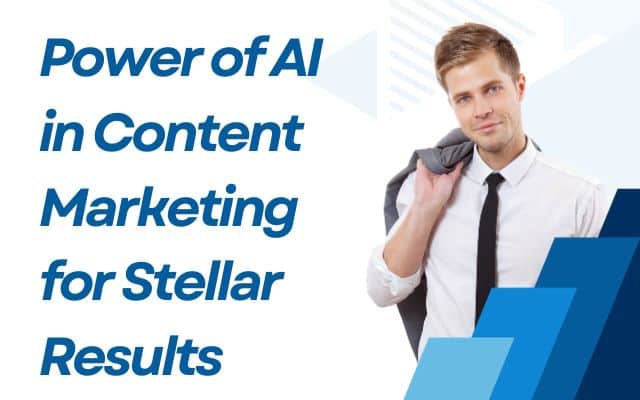Power of AI in Content Marketing for Stellar Results

Harnessing the power of AI in content marketing can lead to stellar results by enhancing efficiency, personalizing content, and optimizing strategies for greater impact.
Being ahead of the curve is crucial in the fast-paced world of digital marketing. One of the game-changers in this landscape is Artificial Intelligence (AI). This powerful technology is not just for tech enthusiasts – it’s making waves in content marketing too. In this article, we’ll explore how you can harness the potential of AI to supercharge your content marketing efforts.
Understanding AI in Content Marketing:
AI is not some futuristic concept; it’s already integrated into many aspects of our daily lives, and content marketing is no exception.
AI in content marketing involves using intelligent algorithms and machine learning to analyze data, predict trends, and automate tasks. Improving the effectiveness of content production, delivery, and optimization is the aim.
- Content Creation:
- AI-driven tools like OpenAI’s GPT-3 can generate high-quality content, making the creation process faster and more efficient.
- Automated content creation tools are not here to replace human creativity but to complement it. They can produce drafts, generate ideas, and even assist in writing compelling headlines.
- Personalized Content:
- AI algorithms analyze user behavior, preferences, and demographics to create personalized content tailored to individual consumers.
- This personalized approach increases engagement, as users are more likely to connect with content that resonates with their interests.
- Content Curation:
- AI-powered content curation tools sift through vast amounts of data to find relevant and trending topics in real-time.
- These tools help marketers stay informed about industry trends, ensuring that their content remains current and appealing to their target audience.
- SEO Optimization:
- AI algorithms analyze search engine algorithms and user behavior to optimize content for search engines.
- AI tools can suggest keywords, improve meta descriptions, and enhance overall content structure for better visibility on search engine result pages.
- Social Media Management:
- By automating posts, evaluating interaction metrics, and suggesting the best times to post, AI makes social media administration easier.
- Chatbots, powered by AI, can handle customer queries on social media platforms, providing instant responses and enhancing customer satisfaction.
- Email Marketing:
- AI-driven tools optimize email marketing campaigns by analyzing user interactions and tailoring content to individual preferences.
- Personalized email content fosters a more substantial influence on the target audience by increasing conversions and open rates.
- Analytics and Insights:
- Artificial intelligence (AI) tools use data analysis to reveal trends, audience behavior, and content performance.
- These insights aid in the decision-making process, strategy optimization, and adaptation to the dynamic world of digital marketing.
Implementing AI in Your Content Marketing Strategy:
Now that we’ve explored the various applications of AI in content marketing, let’s discuss how you can integrate this technology into your strategy.
- Identify Goals and Objectives:
- Clearly define your content marketing goals and how AI can help achieve them. Whether it’s improving engagement, increasing conversion rates, or optimizing SEO, understanding your objectives is crucial.
- Choose the Right AI Tools:
- Look into and choose AI tools based on your unique requirements. From content creation to social media management, there are various AI-powered platforms available. Make sure they work in unison with the marketing tools you already have.
- Data is Key:
- AI relies on data for effective functioning. Make sure your system for gathering and storing data is reliable. Your AI algorithms will yield more accurate and meaningful insights the more high-quality data you feed them.
- Collaboration Between Humans and AI:
- Understand that AI is a tool to enhance human capabilities, not replace them. Collaborate with AI to streamline processes, gain insights, and boost productivity.
- Stay Updated:
- The field of AI is rapidly evolving. Stay informed about the latest developments and advancements to ensure your content marketing strategy remains cutting-edge.
Challenges and Considerations:
While AI offers immense benefits, it’s essential to be aware of potential challenges and ethical considerations:
- Quality Control:
- Ensure AI-generated content aligns with your brand voice and maintains quality standards. Regularly review and edit AI-generated content to maintain authenticity.
- Privacy Concerns:
- Respect user privacy when collecting and utilizing data. Be transparent about data usage and ensure compliance with data protection regulations.
- Algorithm Bias:
- It’s possible for AI algorithms to unintentionally reinforce prejudices found in the training data. Regularly audit and refine AI algorithms to minimize bias in content creation and distribution.
- Adaptability:
- The digital landscape evolves rapidly. Regularly reassess and update your AI strategy to stay ahead of industry changes and technological advancements.
Conclusion:
Integrating AI into your content marketing strategy is not just a trend; it’s a strategic move to thrive in the digital age. By leveraging the power of AI, you can create more personalized, engaging, and data-driven content that resonates with your target audience. Embrace this technological evolution, stay informed, and watch your content marketing efforts reach new heights. As the saying goes, “The future is now,” and with AI in content marketing, the future looks brighter than ever.







